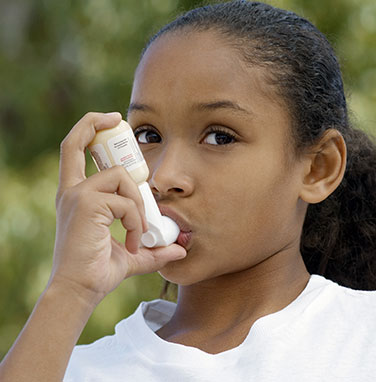
Asthma
Useful if: Someone in your home has been diagnosed with asthma
GHHI Tips
- Dust mites: Dust mites but don’t bite humans or spread diseases, but they can make asthma worse. Use covers for pillows and mattresses and wash your bedsheets in hot water
- Removing Mold: Dip a brush in soapy water (not bleach) to clean visible mold. Dry the surface after you’ve cleaned them. Use gloves and protect your eyes
- Pests: Keep food in sealed containers so pests can’t get to it. Clean up all food crumbs. Remove pet food and water overnight. Eat all meals in one place instead of in every room of your home. Use caulk to fill the holes that pests can use to enter your home
- VOCs: Chemical are in cleaning products, pesticide, and air fresheners; these chemicals are called “”VOCs.” Switch to VOC-free products and open windows and turn on fans while you use these products
- Tobacco and Smoke: Smoke from tobacco products or fireplaces can make asthma worse. Do not smoke in a home. Have your chimney inspected and cleaned each year.
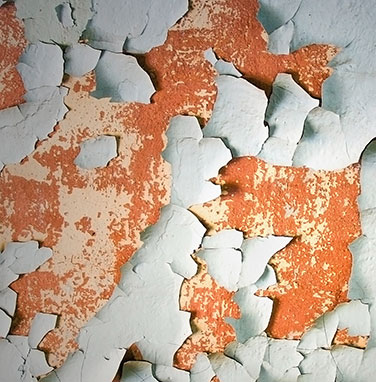
Lead Paint
Useful if: Someone in your home has been diagnosed with an elevated blood lead level and/or you observe chipping, peeling, or flaking paint in your home
GHHI Tips
- Blood-Lead Testing: Tell your doctor to test your children who are under age-6 and any pregnant women who visit or live in your home for lead if it was built before 1978 and has not received a state-issued lead certificate
- Cleaning Chipping Paint: If you see chipping, peeling, or flaking paint, use the two-bucket system to clean it up. Put soapy water in the first bucket, then put plain water in the second bucket; dunk your mop or sponge into the soapy water and wipe up the chipping paint, then dunk your mop or sponge in the plain water before putting it back in the soapy water
- Keeping Toys Clean: Wash your kids’ toys in hot, soapy water
- Certified Home Lead Inspection: Get your home inspected if it was built before 1978 and has never been looked at by a certified Lead Inspector or if there is no record of a state-issued lead certificate for the property.
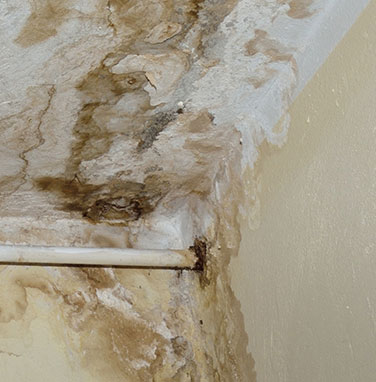
Standing Water and/or Mold
Useful if: You observe standing water and/or mold in your home
- Removing Mold: Dry any flooded area within 24 hours. Use a brush dipped in soapy water to clean areas where you see mold and dry any surface after you’ve cleaned it. Use a fan to dry carpets and walls after you’ve cleaned them.
- Supplies for Cleaning:
- DO NOT use bleach
- DO use eye protection
- DO use gloves
- In the Bathroom: If you see mold in your bathroom, make sure there’s an air vent that leads outside your home. If you don’t have a vent, consider opening the bathroom window while the shower is running.
- In the Basement: If you see mold or standing water in your basement, check to see whether your gutters are clear. Make sure that the water from your downspouts is carried at least 5-feet away from your home. Make sure the ground around your home doesn’t slope towards your home, causing rainwater to run towards your walls and doors.
- In the Kitchen: If you see mold near your kitchen sink, caulk around the sink itself and check the pipes under the sink to check for a potential leak.
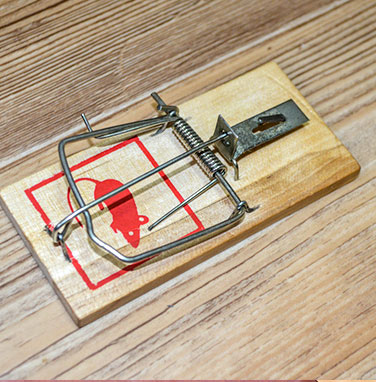
Pests in the Home
Useful if: You are having issues with pests being in the home, including rats, mice, and/or roaches
GHHI Tips
- Food Sources: Keep food in sealed containers so pests can’t get to it. Clean up all food crumbs. Remove pet food and water overnight. Eat all meals in one place instead of in every room of your home
- Trash Cans: Wash trash cans once per month. Put lids on your trash cans, and don’t keep trash in your home
- Keeping Pests Out: Find holes in walls and near your home’s floor and fill them with caulk, concrete, and/or plaster
- Droppings: Remove frass (pest droppings) by cleaning the area with a sponge, soap, and water.
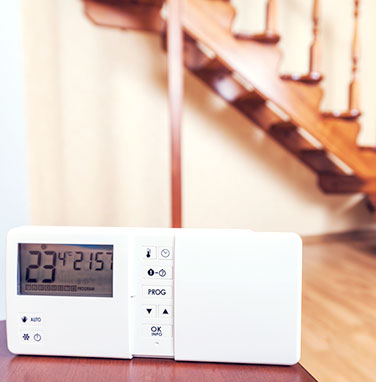
Temperature Regulation
Useful if: You are having trouble regulating the temperature in your home
GHHI Tips
- Comfortable Temperature in Your Home: Clean the air filter in your home. Apply caulk around your windows to prevent inside air from getting out. Upgrade the weather stripping around your doors
- Space Heaters: Never use your oven or stove as a heater. Place electric space heaters so people won’t trip over them. Make sure your space heaters don’t come in contact with your belongings
- Light Bulbs: Consider switching to compact fluorescent lightbulbs (CFLs) or LED bulbs. Both use so much less electricity than traditional light bulbs that they pay for themselves in 6 months.
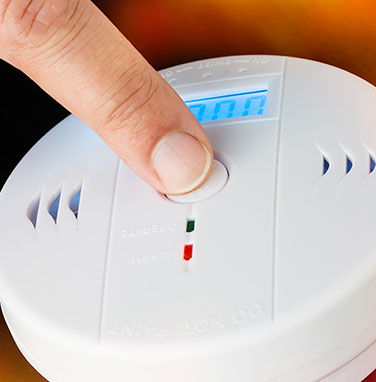
Missing Smoke Detector and/or Carbon Monoxide Detector
Useful if: You are missing a smoke detector or carbon monoxide detector in your home, and/or if you are unsure where you need these items
GHHI Tips
- Installing Smoke Detectors: It’s recommended that you have one smoke detector per floor in your home. If you only have one smoke detector, it should go outside the room where your family sleeps. If a family member is sleeping near a furnace, it should be installed there, instead.
- Detector Placement: Smoke detectors should be placed 9-10 feet away from your kitchen, bathroom, and/or water heater and furnace. Smoke detectors placed near the top of a wall are easier to access than detectors placed on the ceiling.
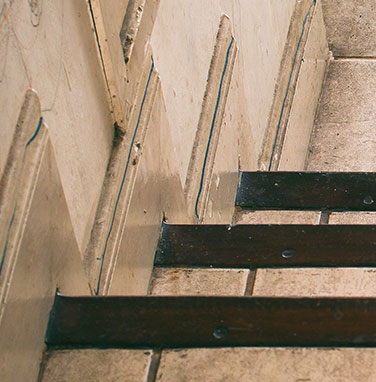
Broken Steps/Missing Tiles/Missing Handrails
Useful if: You have broken steps/missing tiles/missing handrails in your home
GHHI Tips
- Tripping Injuries: Broken steps, missing floor tiles, and missing handrails can cause family members or visitors to your home to trip, fall, and injure themselves. Prevent trips and falls by securing loose rugs. Keeping the floor clear of children’s toys when they’re not being used.
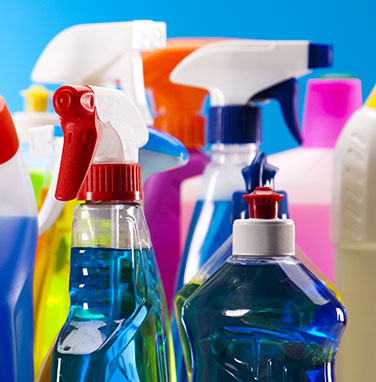
Unsafe Cleaning Supplies
Useful if: You are concerned about your children’s access to cleaning supplies
GHHI Tips
- Cabinet Locks: Install cabinet locks on all cabinets that contain dangerous chemicals, cleaning supplies, or medications, even if they’re out of reach of a child
- Reusing Soda Bottles: Don’t put cleaning supplies in old soda bottles or in old food containers
- Pest Traps: Use sticky traps instead of pest poison on your floors.
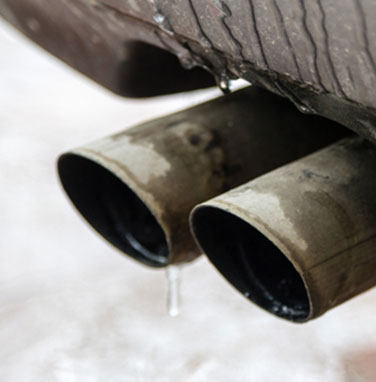
Clothes Dryer/Garage
Useful if: You are concerned about exhaust from your dryer or garage contaminating your home
GHHI Tips
- Laundry: Check to make sure the exhaust in the back of your clothes dryer is vented outside your home
- Garages: Do not leave your car running in your garage, even to warm it up in the winter, to prevent the build-up of deadly gasses.